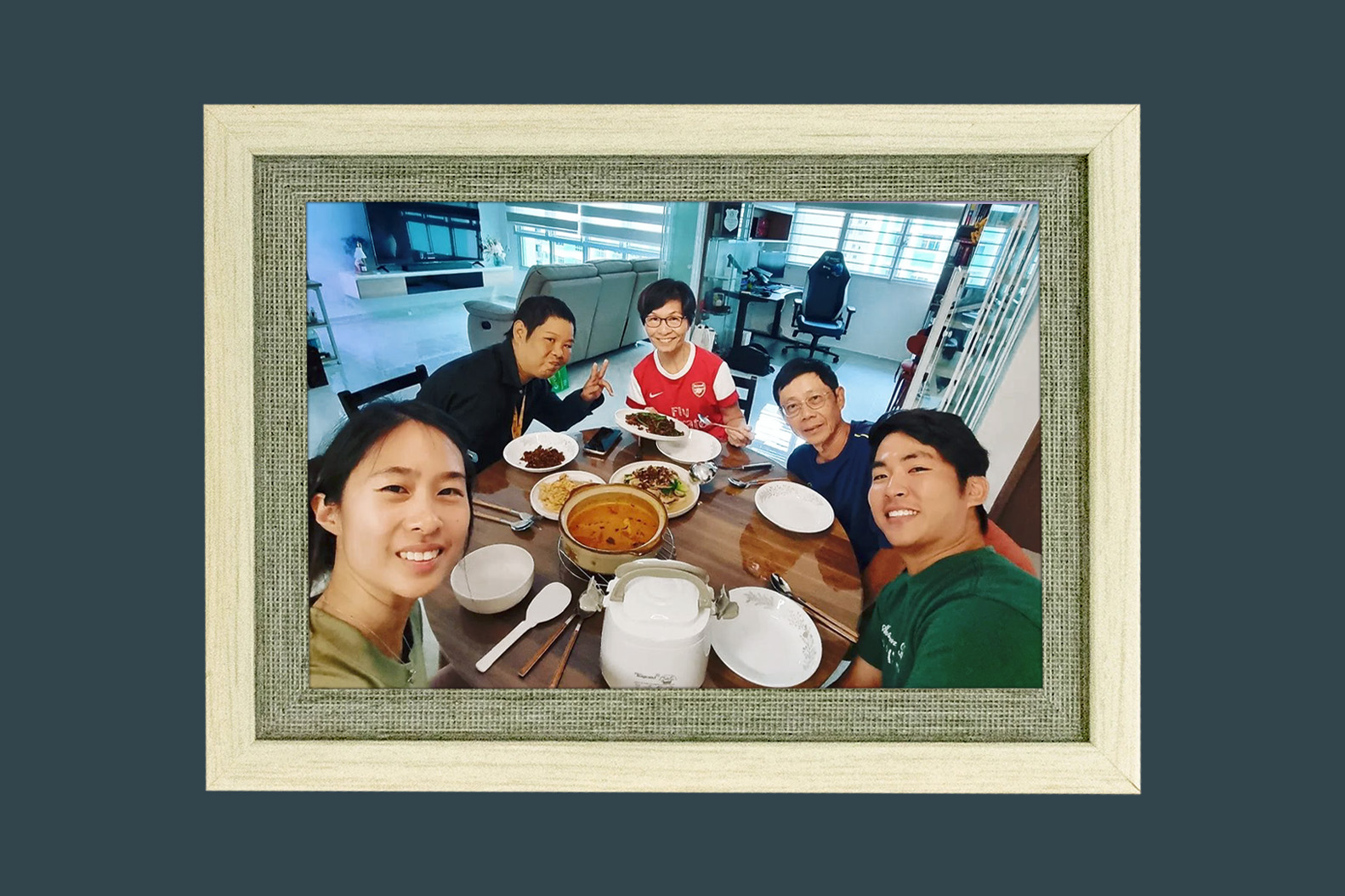Reading about how Xavier Yap strangled his two autistic twin sons to “relieve” the caregiving burden on his wife, 32-year-old ABIGAIL LEE broke down and wept uncontrollably.
As someone with a sibling who has special needs, Abigail knows well the loneliness, hopelessness and desperation that might drive a father to unspeakable acts, and finds herself staring in a mirror that showed what could have been her own family’s fate.
She shares what growing up with an older brother with special needs was like, the lowest lows her family experienced— and what helped to carry each of them through their darkest days.
Before I could finish reading the article, I burst into tears. I had to excuse myself from lunch because I could not hold in my emotions. I simply broke down. The sense of helplessness, hopelessness and darkness was overwhelming and I was devastated.
This sense of hopelessness I know all too well within my own family. Having a brother with special needs, there were period of times where my family would go through seasons of utter despair.
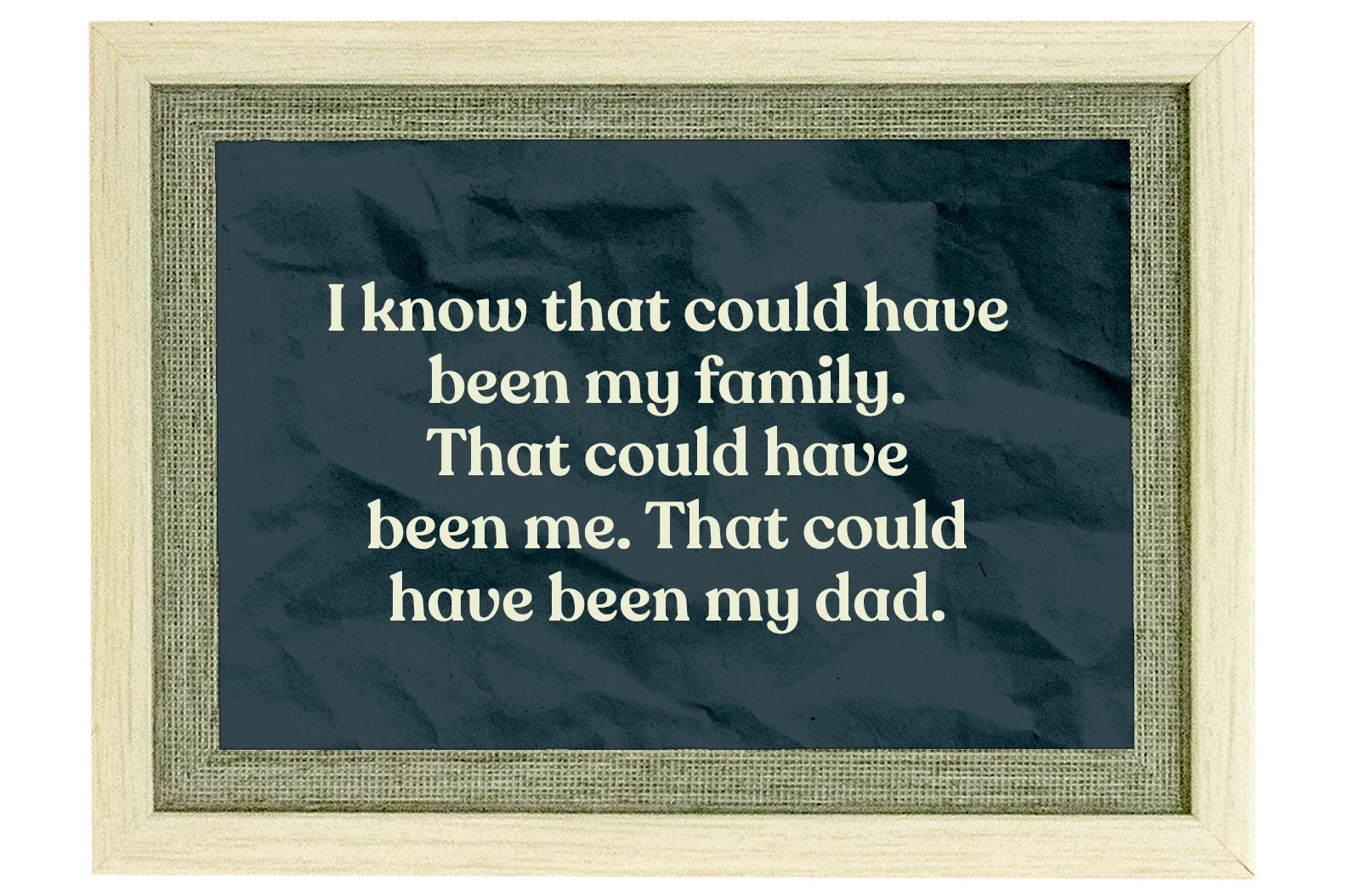
I myself had many dark thoughts growing up, but they were something I kept to myself without telling my parents.
I did not want them to have one more thing to worry about on top of my brother. I lived many years of my life feeling down and angry all the time, because I had to grow up with an older brother like that.
As I read the article, all these old emotions surfaced again… I was there. I have felt that sense of hopelessness before, and I knew very well that that could have been my family.
That could have been my dad. That could have been me. It hit so close to home for me, and I had to weep.
Growing up with a brother who never grows up
My brother is four years older than me. He’s 36 this year, and he was born with an intellectual disability.
When we were kids, we got along very well. We used to play make-believe and build pillow forts. It’s a memory I hold on to very dearly.
But then, I entered secondary school… and he still didn’t grow up.
I couldn’t understand why. And I got very frustrated at that.
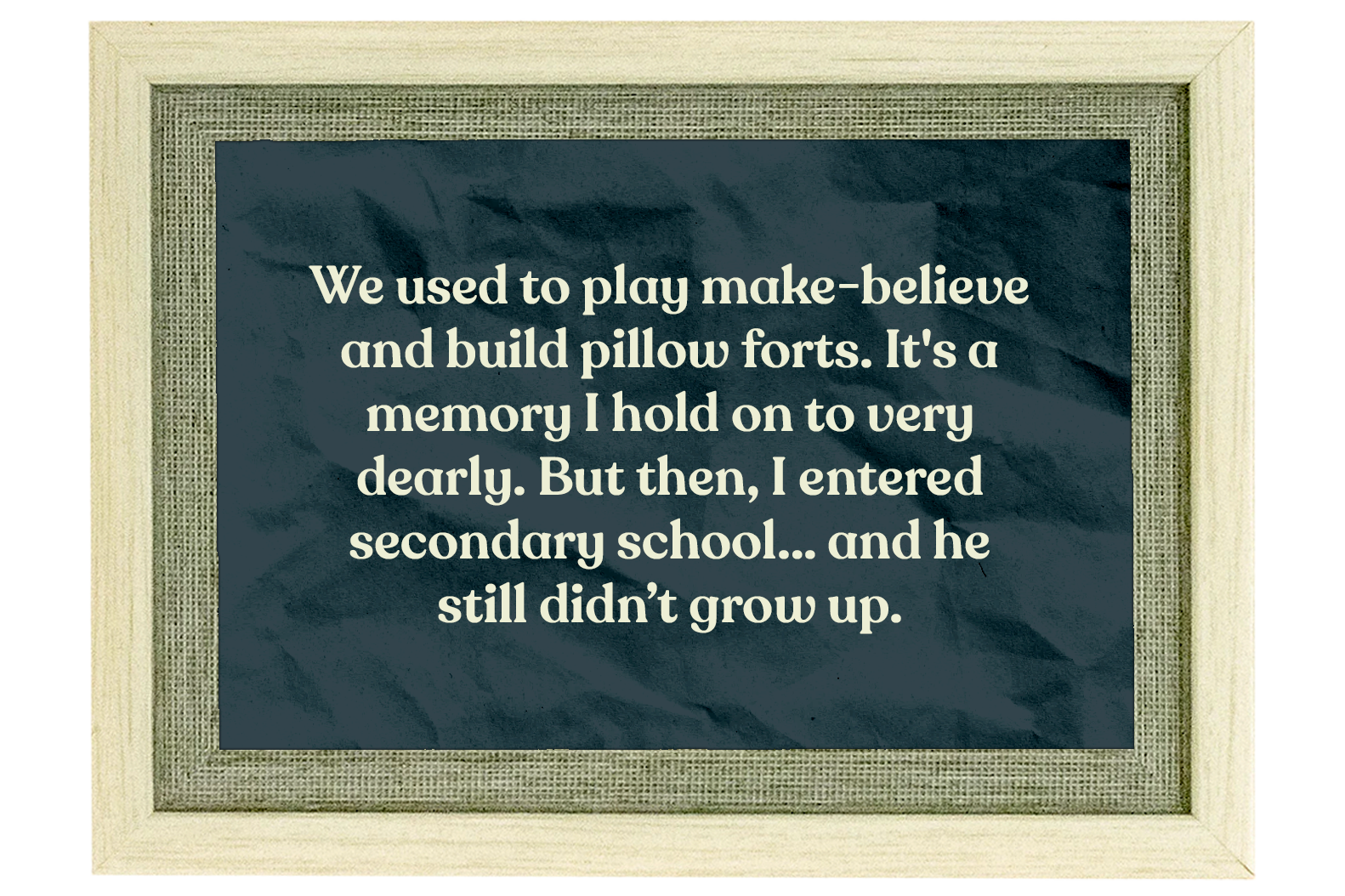
On top of his intellectual disability, my brother also has attention deficit hyperactivity disorder (ADHD).
He was not able to go to a mainstream school because he was always very hyper and couldn’t sit still in class; he was seen as a defiant child who misbehaved a lot.
As he grew older, he also developed many physical ailments which we suspect could have stemmed from the many medications he’s been taking over the years for his mental issues.
He is currently required to go for dialysis three times a week due to his kidney failure and he also has had many health scares before, having to go in and out of the hospital almost every other week.
His condition worsened through the years as his health deteriorated. All these ultimately also affected his mental health, resulting in depression, and he has tried to take his own life many times in recent years.
That being said, he’s still considered high-functioning – he is able to take public transportation by himself and is able to go alone to the coffeeshop to buy food.
However, he can’t really understand social cues and he often does inappropriate things in public to get the attention of those around him. This includes shouting in public or creating a disturbance which would cause people to stare at us and shake their heads.
It has been and continues to be really embarrassing for us to be with him in public places.
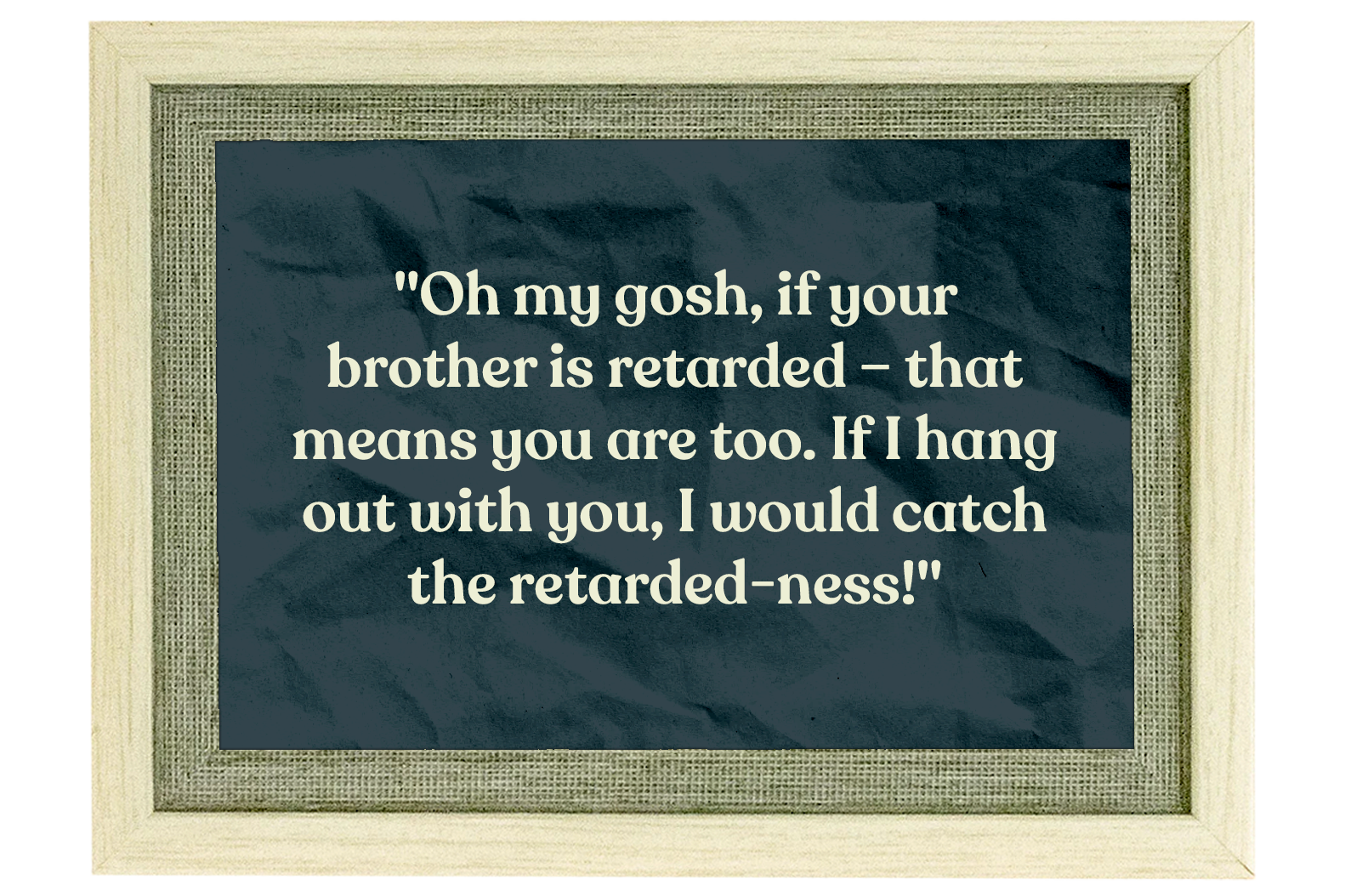
Church was no exception. When I was much younger, we used to attend church as a family but we would always leave feeling like we didn’t belong or that our family wasn’t good enough.
Though there were some very dear Christian friends who journeyed with my parents, ultimately, there were a lot of hurts.
It was… a bad experience growing up in church because of this. Through it all, I was so ashamed. And more than that, I was angry.
- I felt angry that I even felt ashamed
- I felt angry that people didn’t understand
- I felt angry that people were judging my family
- I felt angry that I couldn’t do anything about it
- I felt angry that my parents couldn’t do anything about it
- I felt angry with my parents for bringing my brother into this world
- I was angry at society for not being able to care for my brother
I was so angry at everything and everyone. Anger coloured those years. It just seemed like the whole world was against me and against our family.
Shame and fear
And then, there was always having to hide. My schoolmates would always ask if I have any siblings. Not knowing how to explain my brother’s condition, I often lied and said I was an only child.
Maybe one reason for my reticence is because I had many bad experiences when I was younger.
When I was in Primary One, I opened up to my best friend about my brother and how he had special needs.
As a seven-year-old, I don’t think she knew how to reply. But I would never forget her words till today. She gasped, “Oh my gosh, if your brother is retarded – that means you are too. And if I hang out with you, I would catch the retarded-ness!”
She didn’t want to hang out with me after that.
Misunderstandings and careless words like these created pain and a fear of being vulnerable with others about what was going on at home.
And so, for a big part of my life, I kept secret anything to do with my family. A lot of my peers didn’t know, and even when I told them about it, I said it in a way like it was no big deal.
Oh, we’re doing well — I just have a brother with special needs — but we’re all good. I would say the words, but deep inside I knew it was unhealthy and I needed support.
Making peace, again and again
Shame, fear and anger. That describes my childhood and formative years.
However, as I grew older and came back to the Christian faith again, I was able to make peace with the situation. I’ve accepted the way things are with my brother and that he will continue to be like this on this side of eternity.
A big step for me was learning how to embrace and manage my emotions. One way is by ensuring that I have someone whom I can talk to about what I’m feeling.
I also tell myself that it’s okay to cry or feel angry, and I don’t stop my emotions from coming.
I don’t try to rationalise my tears away — it’s okay to feel sad. It’s okay to feel angry.
But I also make sure to bring all these emotions to God, and allow Him to comfort me.
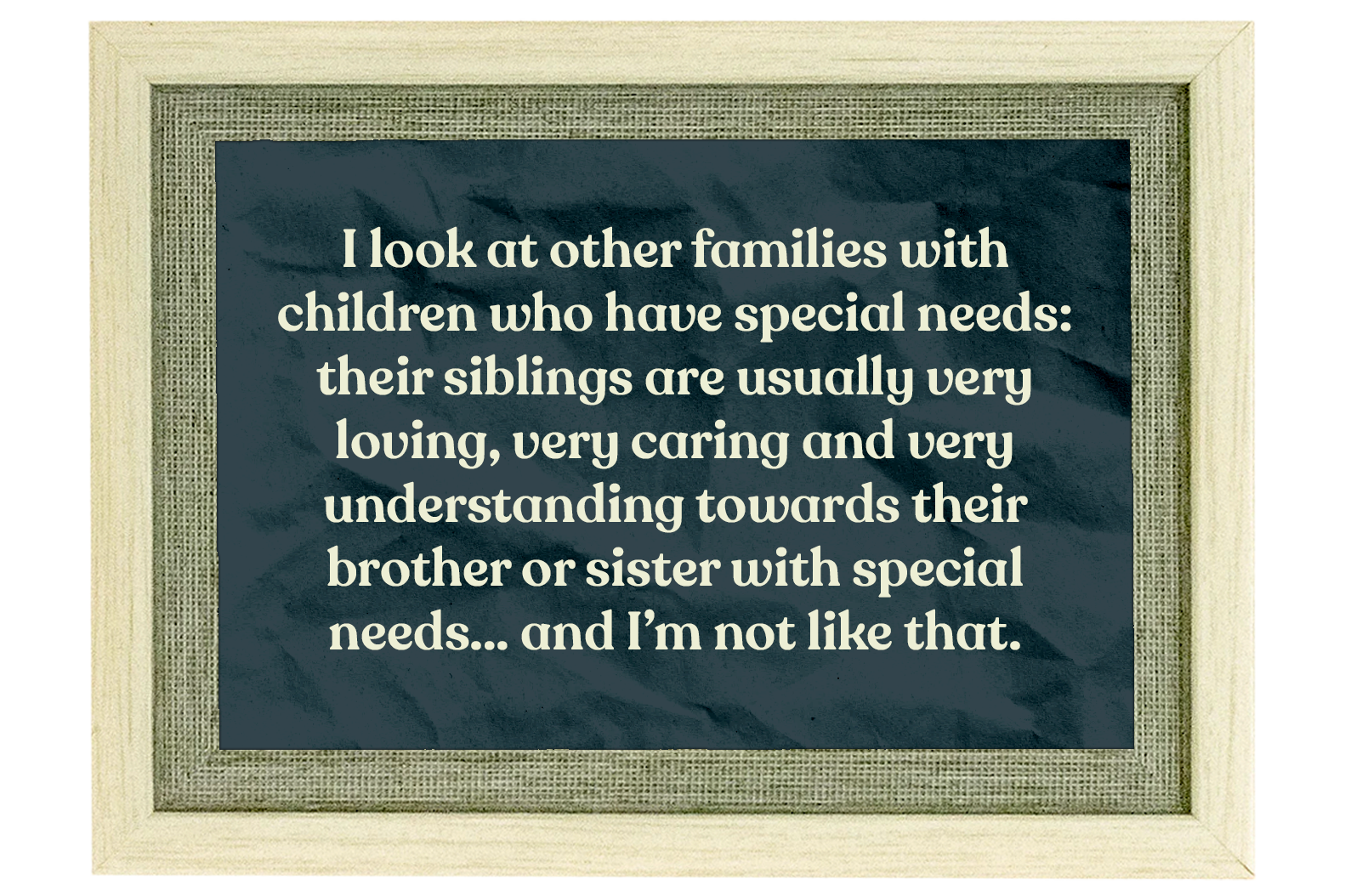
Even so, I still struggle a lot with feelings of disappointment and being upset at my brother when he has flare-ups at home.
I find it so challenging because I don’t know how to interact with him without feeling upset and I still feel uncomfortable around him even till today (though things are a lot better than in the past).
I’m still trying to grow in this area and still trying to be more and more loving towards him, but I really struggle with the guilt of not being able to do so consistently.
I look at other families with children who have special needs: their siblings are usually very loving, very caring and very understanding towards their brother or sister with special needs… and I’m not like that.
I’m struggling, but I’m doing my best to learn how to love my brother more.
Hopefully, by God’s grace, I will be able to do so one day.
Caregiver for the caregivers
My parents have been amazing and are taking on the bulk of the caregiving responsibilities. I really want to support my parents – to love them and care for them as much as I can.
I see my role as caregiving for the caregiver. I do my best to frequently meet up with my parents, one-to-one, to have conversations with them. I let them rant and let them be upset in a safe space. Sometimes, we just hang out and not talk about what’s going on home at all.
When we return weekly for family dinner, my husband and I will also try to engage my brother more so that my parents have a bit of space to relax.
We are a very practical family, and we understand that each of us has different strengths. We have learned to play to our strengths in supporting one another.
My parents can clearly see that I’m not the best at handling my brother. However, I am able to be a safe space for my parents to be themselves and to give them a listening ear when they need it.
And so that’s what I do. I bring them out for kopi; daddy-daughter time or mummy-daughter time. We’ll talk, and we’ll just process things together.
I’ll just be a listening ear. That’s how we’ve come to support one another.
Caregivers for the caregiver for the caregivers (aka, How to help!)
If I am my parents’ safe space, then my own safe space would be trusted people like my cell group, my mentors and my close friends.
We all need someone who will hold space for us to be real with the emotions we feel, without being judged. We all need to have that outlet, and there will be times when it is hard or even impossible to be the outlet to one another in the family.
That’s why it’s crucial to also have people whom I can trust and talk to, and who will just listen. There are times when I don’t need any advice or to be told what to do — I just need someone to hold space in that moment.
One source of support that has been very helpful is when people take the initiative to check in on us, and ask how things are. It can be easy to feel like a burden when you want to find someone to talk to, since everyone is busy.
Friends who take the initiative to ask, and extend an invitation to hear — this is very, very helpful.
After I got married and moved out of my parents’ place, I went through a period of feeling very guilty.
I felt that I was leaving my parents behind with my brother. They were stuck with him, while I just carried on with my new, beautiful life.
Even though my parents never felt this way, I just felt really, really bad about it.
What got me out of that tunnel was my very dear friends in church who perceived that struggle within me, and who sensed I was really torn up about it.
They comforted me and reminded me that leaving and cleaving doesn’t mean that you don’t love your parents. It doesn’t mean that you’re throwing them away or leaving them behind.
My friends talked me through these things, and helped me get to a healthier place where I could love and serve my family again — without guilt.
Other helpful things would be when people offer practical help by asking if they can bring my brother out for a meal, every now and then, to give my parents a respite.
Though my brother’s situation makes it difficult for outsiders to help us – he can be challenging to control in public – just knowing that we have friends who are willing to come in and help us practically is incredibly encouraging.
Practical help is definitely something that families with special needs are very thankful for.
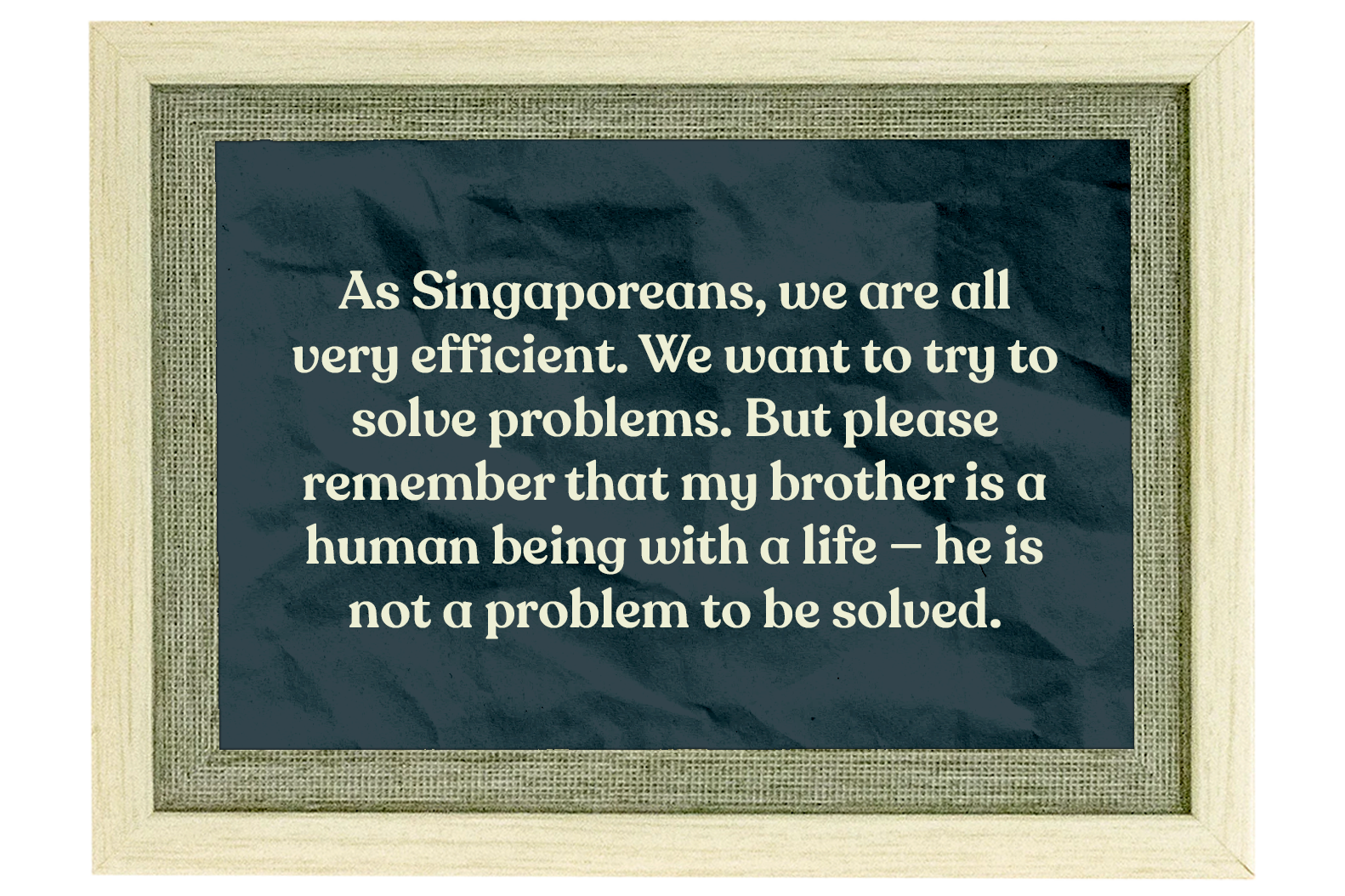
What hasn’t been helpful is when people jump in with the “oh, I’ve got this friend who is in a similar situation” conversation, which tends to come with a lot of suggested solutions.
I know these people are well-intentioned, they are trying to help and to empathise… but the solutions are often not helpful and sometimes even frustrating.
Every family’s situation is different. It is often more helpful to seek first to understand the dynamics of the family, the personalities, and the challenges of the caregiver before offering a solution (and this will take time and effort!).
As Singaporeans, we are all very efficient. We want to try to solve problems. But please remember that my brother is a human being with a life — he is not a problem to be solved.
We know it comes from a good place, but instead of offering solutions, it is much more helpful to ask if we even would like to listen to such suggestions beforehand (again, sometimes we just need some space).
And please don’t be offended if we ultimately don’t take up the solutions offered. In all likelihood, the main caregiver has already explored all the possible options. They would be the subject matter expert, and what may sound very good on paper might not necessarily work out for my family.
Ultimately, I believe the best thing you can do – at least for my family, as every family is different, so I can’t speak for everyone – is just hold space, encourage and affirm the family.
Where I find hope
I find hope in my walk with the Lord. Just knowing that the Lord is in control, that He knows my situation and cares for me — that brings me peace.
God is sovereign. I rest in the hope that He knows what is best for my family. In the midst of the deep waters, He will carry us through. In the midst of the storm, He will give us peace.
That is something that I hold on to, and also the fact that this place is not our final home. This body that we have — that my brother has — is not the final body. We will have a glorified body and it will be free of all this brokenness.
I rest on the hope of the future, that one day, this all will pass. We have a sure and eternal hope to be reconciled with God in a glorified body.
I have a firm conviction that the Lord will take care of me and my family. He is everywhere, He knows everything, He can do all things.
He will take care of my family, and I don’t have to worry.
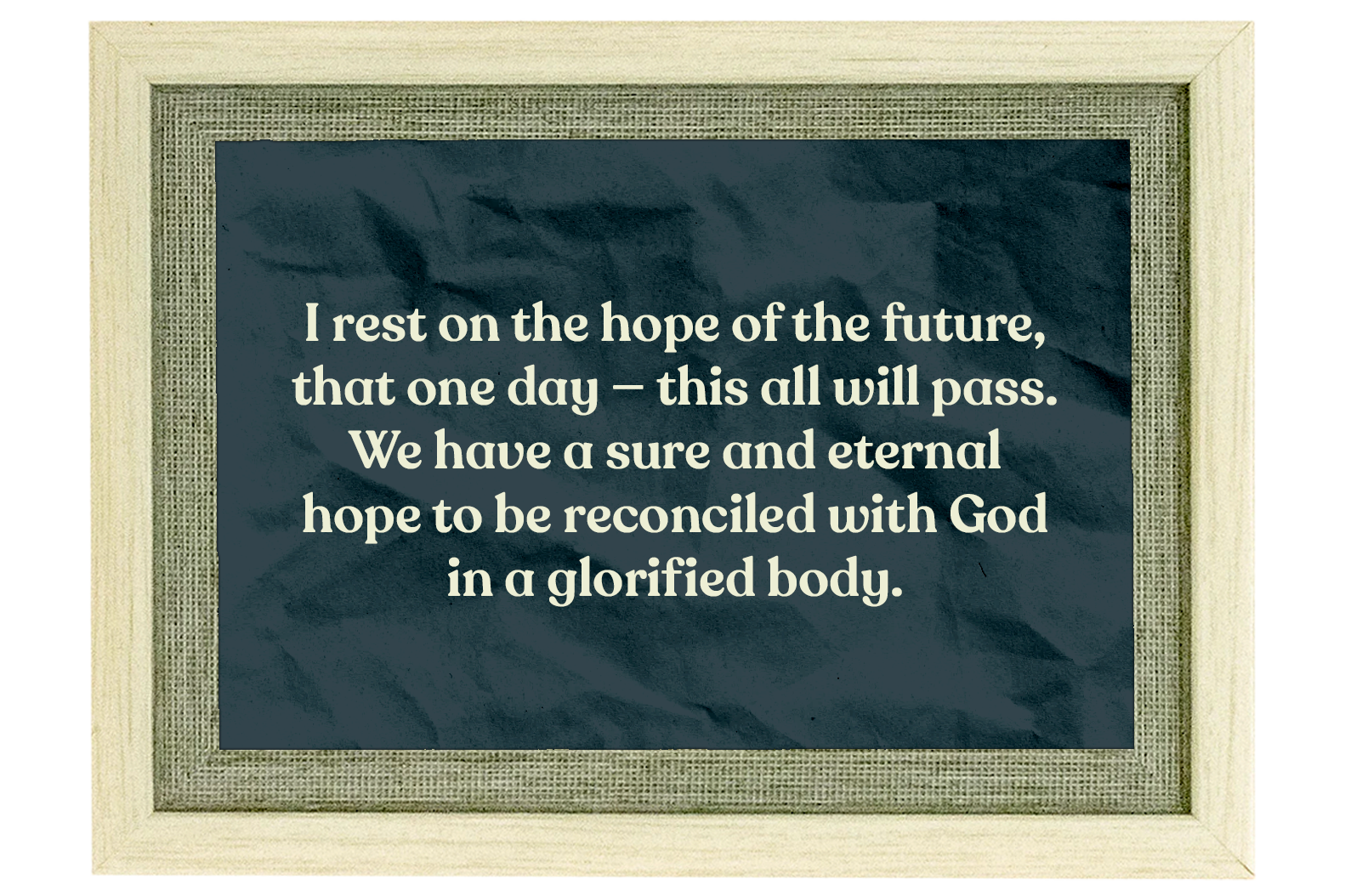
To anyone out there who has a family member with special needs…
The first thing I want to say is that Jesus loves you. He knows how you feel, and He loves you.
And I want to tell you, don’t think you are in this alone. There may be people who don’t understand, but there are people who understand and there are people who want to understand as well.
So never think you are all alone and that no one cares. Don’t spiral downwards, and don’t shut yourself off from others. Voice out to your parents. Talk to older people you feel can trust. Find trusted people you can reach out to.
Don’t make the mistake that I did, shutting off everybody from this painful part of my life for over 20 years.
There are people who care — and I am one of them. I posted recently on my Instagram that if you’re a young person and you face a similar struggle as I did, I’m happy to just listen and to process with you, or simply hold space for your emotions.
That offer still stands. Just get in touch with me through the good people at Thir.st.
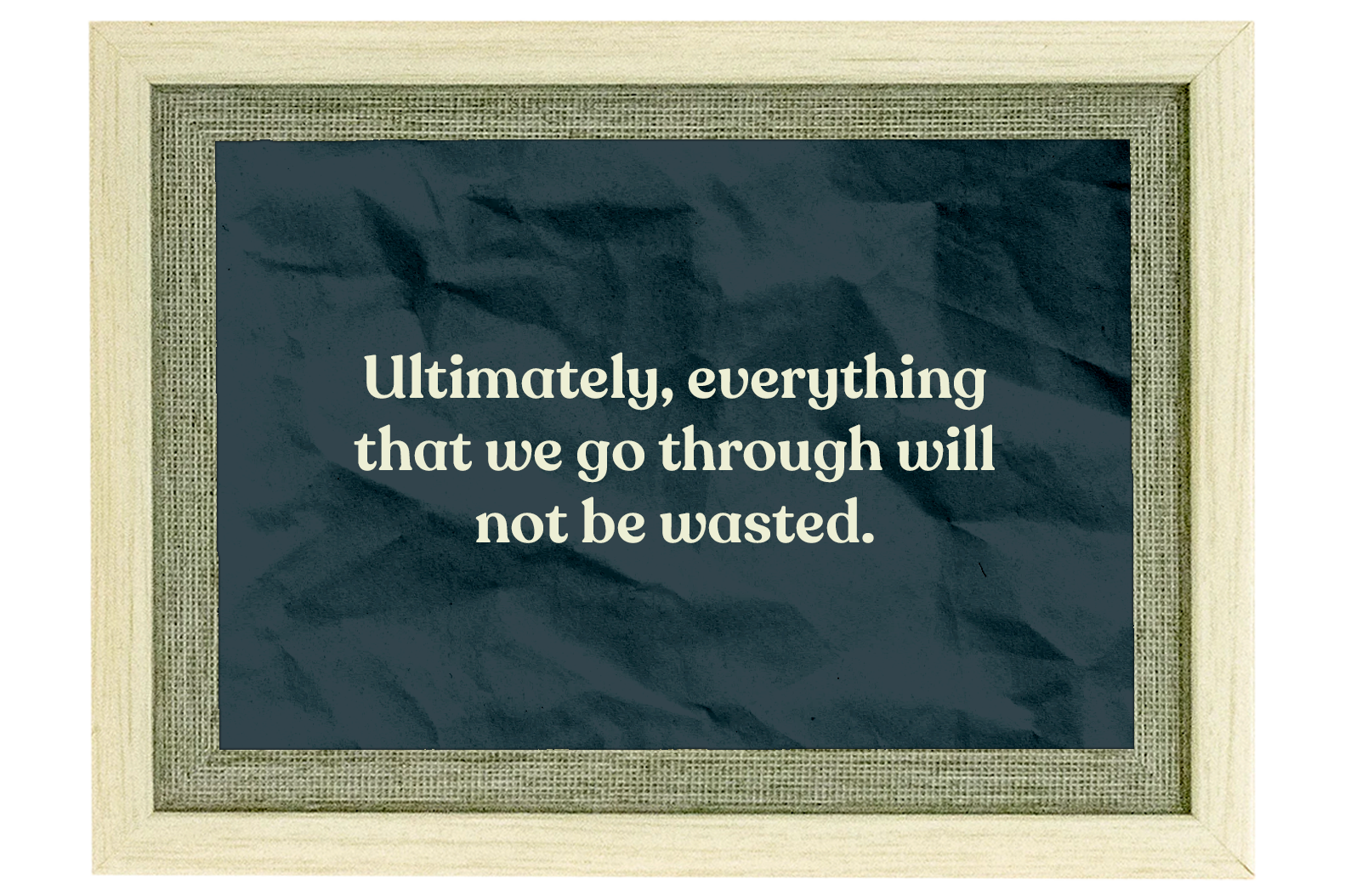
There were many times when I was younger when I said that if I didn’t have my brother, I could have been much less broken and achieved so much more.
I thought to myself that if my parents didn’t have my brother, we could be so much wealthier!
We could have been well off, living the life, but because of my brother, my dad had to quit his job to be a full-time caregiver. And on top of that, there were all the medical bills they have had to pay through the years.
But I just want to tell you this: ultimately, everything that we go through will not be wasted.
Nothing is wasted. God cares for you and He is going to grow you and heal you. Though things are difficult, He is going to develop you more and more into His likeness.
Keep on holding to the hope that God will turn all this brokenness in the world, all this pain and evil, into something good.
So don’t lose heart. Don’t lose hope.
Take a step back, breathe and continue to hope in the Lord.


